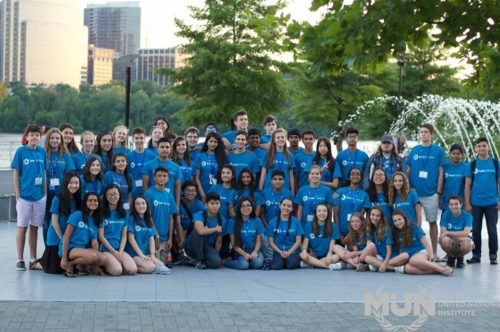
A combination of training and social experiences can help retain new Model UN club members who have just signed up. Pictured: Model UN Institute students out on a social event in Washington DC.
Retention is one of the biggest pain points for Model UN club officers. The officers may have put in a lot of effort to recruit members to the first meeting and hyped up Model UN, and hopefully a significant number of students are interested enough to become members. But the work does not stop there. The new members need to be immediately engaged into the MUN club so that it becomes a priority for them. Otherwise, there is a high likelihood that they may drop out once schoolwork gets busier or once the activities for another club picks up. Here are five ways to retain new Model UN club members:
1. Sign them up for a first mock session or novice conference
New club members need to have something concrete to look forward to. Signing them up for a first mock session or a novice conference sometime in October or November anchors them into the Model UN club. They have a purpose for showing up to meetings and trainings because they know there’s a significant event they’re about to participate in. They’re excited about representing Colombia or Malaysia or whatever their first-ever country assignment is, and they’re probably nervous and overwhelmed at all these new terms they have to learn. But that’s a good thing — it gets them engaged with Model UN. For many of the best Model UN clubs, members must attend the first mock session or novice conference before they could travel to other conferences; it’s almost like a basic tryout to see if they are both interested in and committed to MUN.
2. Sign them up for a training plan leading up to that first mock session or conference
New club members need a training plan to prepare for that mock session or novice conference. It’s important that the training is structured and has a curriculum so that they know that they will be prepared if they follow it. For example, you could let them know that there are four training sessions — one each week that focuses on a different MUN skill — that they have to go through leading up to the mock session. Having ad hoc training is still better than nothing, but it faces the risk of people not scheduling around it or opting not to attend. And having no training pretty much will cause most casual members to lose interest or even drop out of the mock session last minute because they feel so unprepared.
3. Assign a veteran delegate to serve as their mentor
Assigning a veteran delegate to mentor a new club member or a set of new club members is a good idea for retention. Specifically, it allows the new delegates to get personalized help that they would not get in a group training setting. New delegates may also feel too shy asking questions or asking for help in a more public setting. Having a veteran mentor can help clarify the new terms, give them more practice with public speaking, and help guide them on their country-specific research and position paper-writing for the first time. It also gives them a sense of what the club culture is like and what success looks like — they get a better feel for their future in the club.
4. Host a club-wide social
Hosting a club-wide social creates a new dynamic in the Model UN club. A good number of club members participate not solely because they love Model UN, but because their friends are also in the club. They want to show up at MUN club meetings because all their friends will be there. You want to create this dynamic with the new members and get them to feel comfortable with all the returning members. New members are also more likely to stay involved with the MUN club if they feel that the club is fun and if they get a sense that they can make friends through the club. Common social events include pizza parties, ice cream socials, or team bowling.
5. Get to know them individually
One of the biggest positive impressions that an upperclass club officer can make is to try to get to know as many of the new club members individually as possible. New members feel like the club leadership cares about them if they make an attempt to get to know them. At the very least, learn all their names in the training sessions leading up to the mock session. If possible, try to have a quick conversation with each person during the club-wide social. Introductions can be easily facilitated through other veteran delegates who are serving as mentors for new club members, and mentors can even pair up their mentoring sessions together so that they can meet more of the new delegates.


